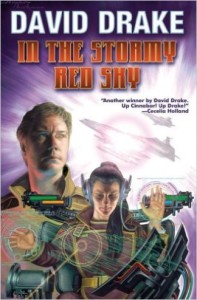I learned with the first book of the RCN series, With the Lightnings, that I have to explain that I use English and Metric weights and measures as a convenience to readers, not because I think the same systems will be in use three millennia hence. To me, that went without saying. Here as often, I was wrong.
There are many snatches of song in this novel, as generally in my work. They’re all my paraphrases of real music ranging from The Handsome Cabin Boy to the Carmen Saeculare of Horace. I do this for my own amusement–but people do sing, and I think it gives the work resonance to use pieces that people have sung instead of pieces that I’ve invented.
My fantasies are generally based on folk tales. My science fiction (and this is true of both Military SF and Space Opera) almost always grows from historical events, more often than not from ancient history.
That’s certainly true of In the Stormy Red Sky, where I weave together three separate incidents which took place in the Mediterranean Basin during a five-year period (216 bc to 211 bc):
1) The death of Dionysius II, whose grandson Hieronymos succeeded to the throne of Syracuse.
2) The successful revolt (or coup, if you prefer) of a group of young aristocrats in Tarentum, aided by Hannibal.
3) The successful assault by Scipio (later Scipio Africanus) on the fortress city of Cartagena.
On the face of it these events had nothing in common, but in another sense they’re woven about one another like strands in a sweater. They were aspects of the war which decided who would rule the Mediterranean Basin for the next thousand years.
The unseen impetus of all three situations was the Battle of Cannae, Hannibal’s crushing defeat of a large Roman army in 216 bc. Cannae was the epitome of the decisive battle except in one crucial aspect: it decided nothing, beyond the fact that certain individuals would die that day instead of dying later.
Cannae affected the attitude of the teenaged boy who suddenly became the Tyrant of Syracuse. It affected political calculations within the Greek cities of Southern Italy. It affected the choice of an initial field of operations made by perhaps the best Roman strategist of all time.
What Cannae didn’t do was determine the outcome of the Second Punic War, any more than the Battle of Chancellorsville determined the outcome of the American Civil War.
In history as in life, big events aren’t as important as the way people react to those events. Rome couldn’t go back and undo the mistakes that led to the disaster at Cannae, but the Republic could and did buckle down and deal with the consequences, both good and bad.
I write about people who deal with consequences. I try to be one of those people as well. I don’t hold myself out as a role model generally, but I think the world might be better off if more people accepted responsibility and dealt with consequences.
–Dave Drake
